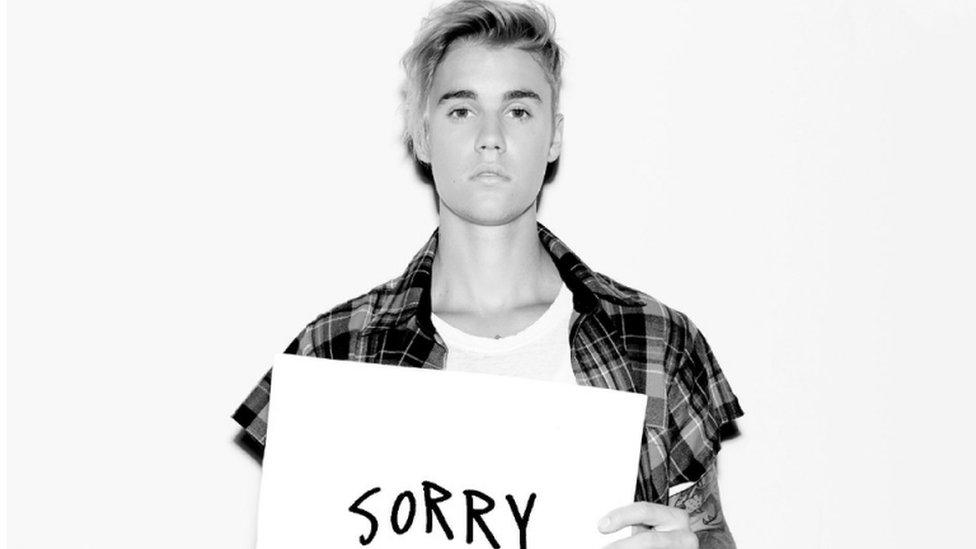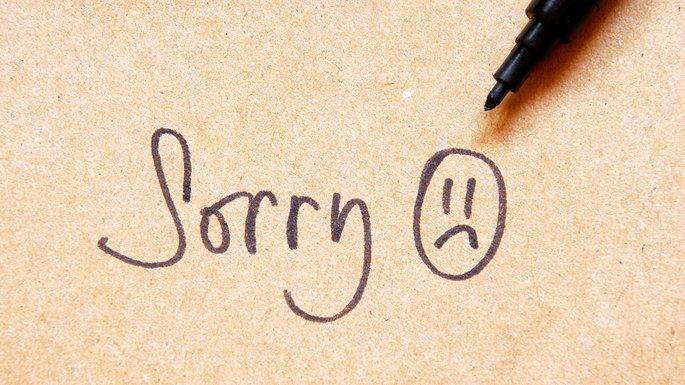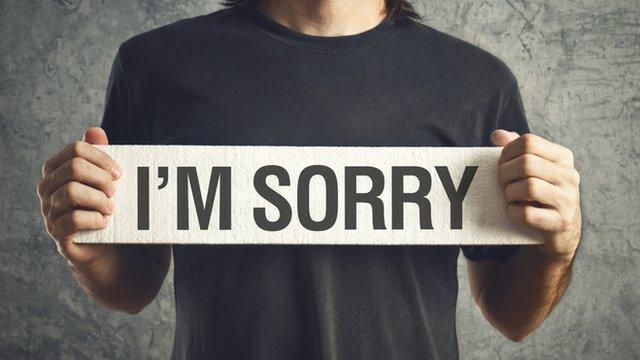How can celebrities walk the social media tightrope?
- Published

Justin Bieber has apologised for his April Fool's prank
"Is it too late now to say sorry?" sang an embattled Justin Bieber in 2015. Four years on, the answer for celebrities, Bieber included, appears very much "no" - particularly on social media.
Fans demand authentic personality, but newly-married Bieber's pregnancy-themed April Fool's joke earlier this week walked him right into the midst of "cancel culture", when people boycott problematic celebrities.
While celebrity names from David Beckham to Kris Jenner, and even Bieber's mother Pattie Mallette, saw the funny side, others branded the star "shameful" and "disgusting".
Within 24 hours an apology had been posted, clarifying that he "didn't mean at all to be insensitive to people who can't have children".
"I am a prankster and it was APRIL FOOLS'" he added.
Allow Instagram content?
This article contains content provided by Instagram. We ask for your permission before anything is loaded, as they may be using cookies and other technologies. You may want to read Meta’s Instagram cookie policy, external and privacy policy, external before accepting. To view this content choose ‘accept and continue’.

So, what explains this Jekyll and Hyde culture, and how can A-listers walk the unpredictable tightrope of acceptable humour and opinion?
The current state of increased sensitivity is arguably the perfect love (or hate?) child between social media "amplification" and celebrity culture.
Edwin L Battistella, author of Sorry About That: The Language of Public Apology, says the majority or public apologies fail.
Dr Pamela Rutledge, director of the US-based Media Psychology Research Center, says that the nature of social media networks allows fans to form "para social" relationships, meaning they "genuinely feel like they know a celebrity" through the intimacy of their posts.
Stars, meanwhile, use this to enhance their reach across social groups to an extent previously unthinkable outside the digital age.
And because society deems "people who appear in the media as important," celebrities become "viewed as role models" - or 'influencers' - in the process.
But this creates what Dr Rutledge describes as the "forgotten irony of social media".
She says stars often forget that the exposure that lifts them up "constrains their privacy" and, by extension, freedom of expression.
The intense feeling of connection through social media relationships means many fans react personally.
As much as they may jump to defend a celebrity from the attack of others, they will also "take exception to the behaviour of a celebrity if it violates their world view" .
"You can't expect to benefit from the amplification and not be subject to the constraints," she says.
Rage against the machine
The polarisation is also heightened by the mechanics of social media itself.
Whereas previously outrage would be limited to small groups to reinforce trust and a sense of community, the internet has taken this principle and transferred it to millions.
A research paper, external on moral outrage in the digital age by Professor Molly Crockett of the University of Yale, found that online platforms have "profoundly changed the incentives" of expressing outrage and information sharing.

Storm in a tea cup?
Justin Bieber isn't alone in watching a social media post provoke an unexpected negative reaction.
Liam Payne apologises for standing atop a tall building
Back in 2014, Liam Payne was at the height of boy band fame with One Direction. A night out with friends led to a picture of him posing atop a high-rise building making its way online.
His loyal teenage fanbase grew so concerned that he was forced to release a statement saying it was "stupid and irresponsible" and warning against replicating his actions
Allow X content?
This article contains content provided by X. We ask for your permission before anything is loaded, as they may be using cookies and other technologies. You may want to read X’s cookie policy, external and privacy policy, external before accepting. To view this content choose ‘accept and continue’.
Lorde apologises for quoting Whitney Houston prior to taking a bath
In 2018, Lorde innocently posted a picture of her running bath alongside the caption "And iiii will always love you," the chorus from Whitney Houston's 'smash-hit of the same name.
She quickly found herself under attack as Houston died in a bathtub in 2012.
Responding to the controversy, she wrote: "Extremely extremely poorly chosen quote. I'm so sorry for offending anyone — I hadn't even put this together, I was just excited to take a bath. I'm an idiot. Love Whitney forever and ever. Sorry again."
Allow X content?
This article contains content provided by X. We ask for your permission before anything is loaded, as they may be using cookies and other technologies. You may want to read X’s cookie policy, external and privacy policy, external before accepting. To view this content choose ‘accept and continue’.

Platforms compete for advertising venue using algorithms built to reward virality, meaning "outrageous content generates more revenue".
User reactions follow the same pattern. The removal of real-life repercussions, as well at the ease with which people can express themselves (think of Facebook's react buttons), encourages extreme responses.
It concludes that this can combine to "provide reputational rewards" for moral outrage online. The chance of likes or follows makes outrage worthwhile.
In light of this heightened emotional state, it is easier to understand how the cycle of outrage forms so quickly, especially combined with the personal relationships fans feel they form online.
Walking the tightrope
Facing an audience that psychologist Geraldine Joaquim says "is constantly looking to be entertained, shocked, educated, thrilled," how are stars meant to cope?
Ronn Torossian, CEO of 5W Public Relations and crisis management mogul explains that in the social media age "time is definitely not on your side".
"Public apologies are pretty much expected and required within 24 hours of the incident. When you're in the hot seat, the first 48-hour window of the crisis is the most important.
"Justin Bieber's response was great. He did exactly what one should do when in the midst of a crisis PR situation - he addressed all of the 5Ws - who what when where and why - and did so quickly and affirmatively.
"He maintained his authenticity and personality while also consoling those who were offended."
"Of course, Bieber did not intend for this to cause so much controversy. But a crisis is never predictable - that's what makes it a crisis."
Looking to the future, Torossian feels authenticity may well be diminished, but as Bieber wrote in his apology on Instagram: "There's always gonna be people offended."
Perhaps a sign of a future in which apologies will be more selective than the outrage.

Follow us on Facebook, external, on Twitter @BBCNewsEnts, external, or on Instagram at bbcnewsents, external. If you have a story suggestion email entertainment.news@bbc.co.uk.
- Published18 January 2018

- Published2 April 2014

- Published3 July 2014
